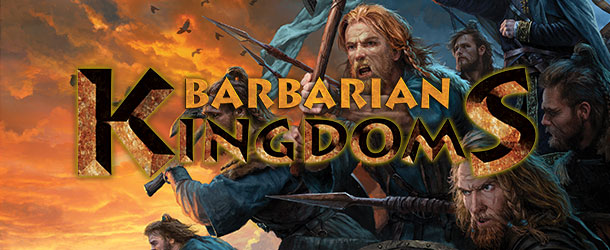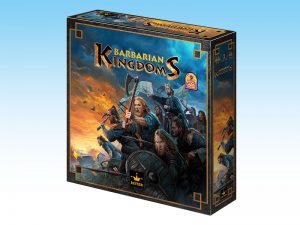"Gold is the lifeblood of the war!"
As the Hun horde swept across Europe, the Germanic tribes moved within the borders of the Western Empire, ultimately causing its collapse. In the twilight of antiquity and at the dawn of the Middle Ages, these so-called "barbarian nations" founded kingdoms on former imperial territory.
In Barbarian Kingdoms, an asymmetrical and competitive strategy game, each player controls a nascent kingdom vying for supremacy over Western Europe. The first player to control seven territories or eliminate two opposing kings is declared the winner.
Players can recruit warriors, collect taxes, invade provinces, reposition units, or claim control of provinces. The most original and surprising mechanism of the game is the bribing system used during battles, which balances the battles while adding chaos, bluffing, and a lively atmosphere to the game.
In this developer diary, we delve into the intricacies of the bribing mechanism, exploring its inspirations, the design process, and the refinements that shaped it into a core element of Barbarian Kingdoms. By understanding the evolution of this feature, you'll gain insight into the strategic depth and dynamic gameplay it brings to the table.
Battle Resolution
In Barbarian Kingdoms, battles are resolved by determining the majority of battle points. Players first commit their units to the battle, with kings worth 6 points and warriors worth 3 points each. The player controlling the province in conflict receives an additional 2 points. After this, both players secretly place a portion of their treasure (tremis) into purses, which are then exchanged. Each tremis wagered adds 1 battle point to the player's total. Battle points are calculated by summing the unit values, the province control bonus, and the bribed (i.e., bid) tremis. The player with the most battle points wins the battle. Regardless of the outcome, the money wagered is kept by the opponent, adding a strategic layer in which players must balance immediate gains against future resources.
The Genesis of the Bribing Mechanism
The idea for the bribing mechanism was inspired by Poker, particularly its zero-sum nature in which what one player wins is lost by another, as well as the continuous stack management throughout the game.
I aimed to capture a similar sense of resource management throughout Barbarian Kingdoms. Initially, players had visible stacks of money, and during battles, they would hide their stacks to secretly decide the amount to bet. They would then swap their bets, essentially exchanging the difference from the higher bettor to the lower bettor to balance the outcome.
Originally, this mechanism was themed as paying mercenaries and collecting weapons post-battle. However, this theming wasn't convincing. Early feedback highlighted the fun of the swapping mechanism and the preference for hidden stacks, which was quickly tested and approved.
Refining the Bribing Mechanism
Some early testers felt that being able to bet everything was too harsh, so I experimented with dials and cards to bet discrete values, with players needing only to swap the differences between bets. However, this led to issues with players betting more than they owned, often unintentionally, introducing an unintended bluffing element.
Managing this within the rules became overly complex and punishing for calculation errors, so I reverted to the idea of betting only what players physically owned. This decision was motivated by the fact that, even if the "no limit" betting was not to the taste of some expert players looking for more control, the fun it provided was highly appreciated by the target audience of the game.
The game was developed during the COVID-19 pandemic, influencing the decision to use purses for the money swap, tying into the new theme of paying bribes. This ensured bets were secret, was manageable even with small hands, and prevented betting more than one owned, simplifying the rules and removing unintentional bluffs.
Comparison with Rising Sun
Barbarian Kingdoms' bribing mechanism is often compared to that of Rising Sun, a favorite of mine. Here are the key differences:
• Single Bet: Unlike Rising Sun's four separate bets resolved successively, Barbarian Kingdoms features a single, simpler combat system.
• Zero-Sum: In Rising Sun, the winner gives their bet to the loser, while in Barbarian Kingdoms, each player takes the other's bet, circulating money without changing the total in play.
• Persistent Stack: Players in Barbarian Kingdoms manage their treasury throughout the game, similar to poker, unlike Rising Sun where money resets after each war phase.
• Hidden Information: In Barbarian Kingdoms, players do not know their opponent's total money before betting, adding uncertainty and strategy.
Testing and Final Adjustments
In early designs, stacks were visible, so there was no need to track them. After changing to hidden stacks, some expert players still engaged in counting because all money flows were publicly known.
To discourage this behavior, which wasn't fun and extended playtime, I introduced random placement of secret chests and a unique diamond treasure. These changes added uncertainty and made precise calculation difficult, even for skilled players, emphasizing intuition and strategy over memorization and calculation.
Discussion of a Suggested Variant
While some players have suggested making bets secret and revealing them only between the two players involved, this variant introduces several potential drawbacks. It would add excessive chaos, diminish the strategic depth, and disengage other players from the outcomes of battles.
Moreover, it could make the game less accessible to those with dyscalculia and reduce the overall enjoyment for players who thrive on the balance of strategy and fun.
While players are always free to adapt the game to their preferences, I firmly believe that the existing implementation of the bribing mechanism is the best fit for our target audience, providing an optimal blend of excitement and tactical depth.
Conclusion
The bribing mechanism in Barbarian Kingdoms is a core element that enhances the game's strategic and atmospheric appeal. Its current design brings a unique touch to the game, offering a well-balanced mix of strategy and fun that resonates with casual and intermediate players. By encouraging both bluffing and strategic thinking, it creates a lively and engaging experience that keeps players coming back for more.














